Decline in PMA Business Cycle Index during August 2016
The PMA has released the results of its Business Cycle Index (PMABCI) for August 2016. Unexpectedly, the results revealed a drop in Palestine's overall index, as industrial sub-sectors failed to benefit from the back-to-school season. Thus, the main sub-sectors' indices declined significantly in the West Bank (WB), and deteriorated heavily in Gaza Strip (GS). Data also revealed a notable decline in near future expectations, which took a toll on the overall index value, which declined further to around 4.6 points, compared to 15.1 points in the previous month, and 6.6 points in the corresponding month in 2015.
In the WB, the index declined for the first time since the beginning of this year, scoring 18.9 points, much below its record (25.7 points) of last month. However, the new value remained higher than in the corresponding month in 2015. Thus, except for a slight increase in the paper industry's index, all industrial sub-sector indices have declined during the comparison period. The major declines were in the indices of the engineering industries (from 4.4 points to 1.5 points), textiles (from 7.8 points to 5.6 points), foods (from 8.5 points to 7.8 points) and construction (from 3.2 points to 2.8 points). Besides, the remaining sub-sectors indices have also decreased but slightly. Anyhow, the drop during August is mainly attributed to lower sales, accompanied by declining production. Moreover, industrial firms' owners showed lower optimism regarding expected production and employment in the near future.
In GS, the highly volatile Gazan index has sharply declined, reaching its lowest level since the recent (2014) Israeli war on Gaza (-32.1 points), compared to -19.1 points in previous month, due to a drop in the main industrial sub-sectors. The food industry index sharply dropped (from 2.1 to -9.3 points), along with a decline in the textile industry index (from -2.3 points to -6.8 points). Moreover, the sub-sectors of furniture, paper and plastic have all witnessed mild declines. Conversely, the deterioration in the construction sub-sector has eased this month, and the index scored progress, increasing from -11.0 points to -5.8 points. It is worth mentioning that several obstacles continued to face the construction sub-sector, mainly due to irregular flow of imported building materials, and the lack of imported amounts. However, the sub-sectors of engineering industries, and chemical and pharmaceutical industries also improved slightly, but remained at negative values.
As in the WB case, the industrial production of Gazan firms has notably declined during August. Also, sales level fell and the inventory accumulated. These developments fed into increased pessimism about the near future among industrial firms' owners, worsening future production and employment forecasts.
Additionally, for more than two years (except for June 2015), the Gazan index continued to hover in the negative range. This reflected the dire and worsening political and economic conditions in Gaza as several negative factors persisted. Thus, supplies of raw materials, electricity and fuel remained deficient; and prolonged delays in reconstruction efforts, lifting the Israeli blockade, and opening the Rafah border crossing continued.
It is also noteworthy that the PMABCI is a monthly index, which aims to capture the state and evolution of economic activity in Palestine by tracking the performance of the industrial sector, especially fluctuations in production and employment levels and their implications for the economy at large. The maximum value of the PMABCI is positive 100 point, while the minimum is minus 100 point; a positive value indicates favorable economic performance, while a negative value indicates bad performance. On the other hand, a value close to zero indicates that economic performance did not change and is unlikely to do so in the near future.






